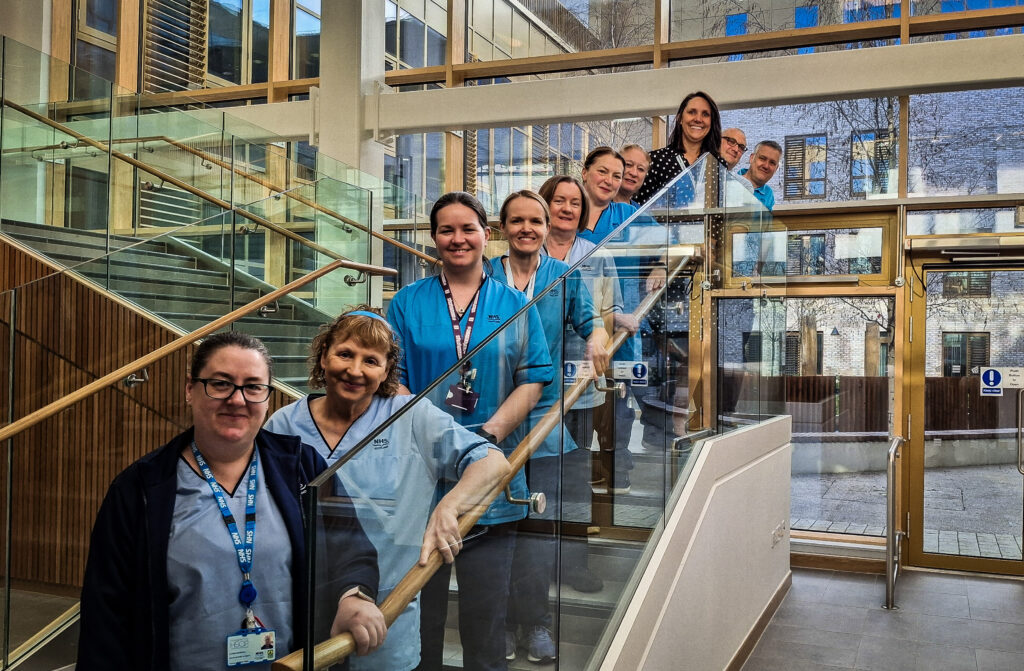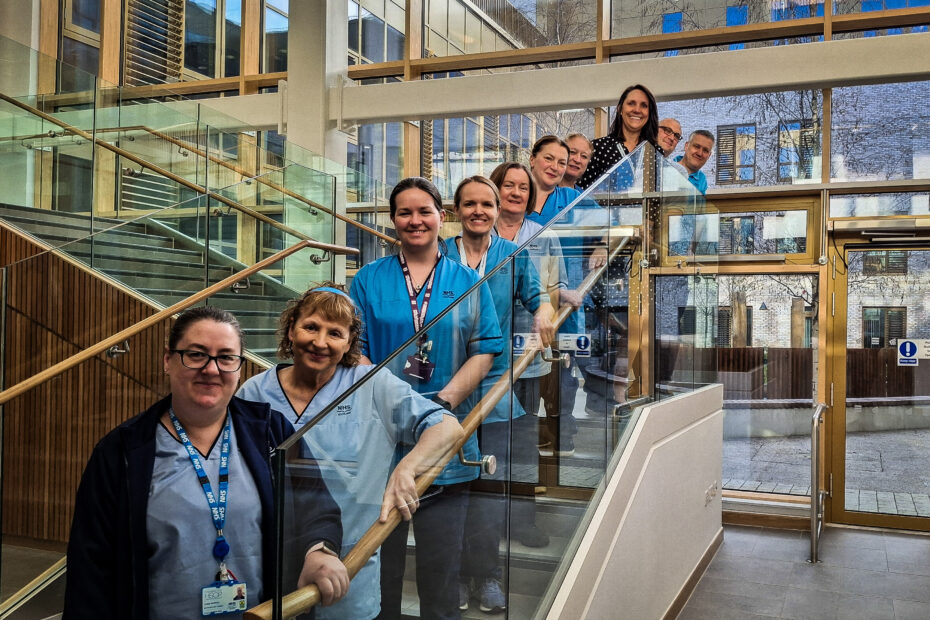
A team has managed to reduce waiting times from up to three months to less than a week for those experiencing frequent falls through an innovative approach to team-working, training and delegation.
The new, streamlined pathway has been developed by NHS Greater Glasgow and Clyde’s North East Rehabilitation Service, which works with older patients who have experienced or are at risk of falls.
The team is made up of physiotherapists, occupational therapists, nurses, dieticians, a community psychiatric nurse, a frailty practitioner and pharmacists, as well as specialists working in podiatry and speech and language therapy services. A team of support workers also manage referrals from GPs, hospitals, care homes, district nurses, third sector and members of the public.
In the past, once a referral for a falls assessment was made a patient could wait up to three months or more to receive the expert help they needed – a time when an older person might be in pain, too scared to leave the house or even too nervous to make themselves a meal or cup of tea.
However, the team saw an opportunity for innovation to improve the patient journey.
Lee Moody, Service Manager, herself a former physiotherapist, said: “We’ve always had a really good team, but the time for patients to access the care they need has been a challenge.
“A couple of years ago we received a winter funding grant from the Scottish Government, which meant we could employ additional Band 4 support workers.
“This provided an opportunity to develop this role within a multi-disciplinary setting, and the falls assessment was one of the innovations which resulted.
“With the appropriate training to upskill these workers, this meant they could all take on a more autonomous role and streamline the patient journey for patients 65 years and older who have experienced frequent falls.”
Rachel Hassan, an occupational therapist and Interim Team Lead at the North-East Rehab Service, said: “Developing the skills of these support workers has been a real game-changer.”
A clinician will complete a telephone triage with each referral and highlight those needing a falls assessment. One of the support workers completes the assessment of a patient and will then fully brief specialists who are identified as required in each case.
Rachel added: “The process is so much quicker now, and it gives patients access to support often in less than a week, compared with the up to three months it took to see a physio, occupational therapist or the like. We have a range of specialists, providing a one stop shop for patients.
“There may still be a wait for specialist treatment, but during that wait, the support worker has the skills to put meaningful support in place very quickly, such as exercises, advice on managing falls etc.
“This also means that the wider demands on physios and other services will reduce over time, allowing for patients who need specialist help to receive it more quickly.”
The pathway involves working with patients to identify tailored goals for each individual.
“You can’t stop everyone from falling,” said Catherine Boyle, another of the Team Leads at the Rehab Service, “so our objective is to help people in a way that suits their needs and circumstances.
“Sometimes the aim is to achieve no falls at all, but not always. It may be to put in place coping strategies so they can manage how they fall and keep going. On other occasions, it may be education and support, as well as practical help.
“For example, if a patient falls and develops a fear of it happening again, they may not eat or drink because they’re too scared to go to the kitchen. That can start a vicious cycle of not eating, which leads to weakness, which can lead to more falls.
“The support worker in this case would be able to provide practical support and reassurance while also calling in specialist help from, for example, a dietician to help address any issues with nutrition.
“It’s not rocket science, but we’ve found the new pathway has led to a better patient journey, while also being better for the service and better for the fulfilment and career progression of the support worker.”
The new framework has been in place for just over a year and while the detailed model is still evolving, early feedback is positive and the signs for the future are good.
Lee said: “The service is under constant review and we’re constantly learning, but we’re all feeling good about this new approach.
“I would like to thank the whole team who are always up for a challenge. They embrace change, always looking for opportunities to improve the service. Whilst all of the team deserve recognition for this achievement, as they have all been part of it supporting its development, we particularly recognise our physiotherapists Lauren and Erin who developed and delivered the training and our pharmacists, Claire and Pauline.
“Of course the support workers are especially deserving of mention – Mags, Jacqueline, Nikita, Angela and Louise. They are committed, dynamic and passionate, and are ultimately the ones that have made this project the success it has been. They are truly deserving of this recognition.”
For more about the Glasgow Rehab Service, go to: https://www.nhsggc.scot/downloads/glasgow-city-rehabilitation/

